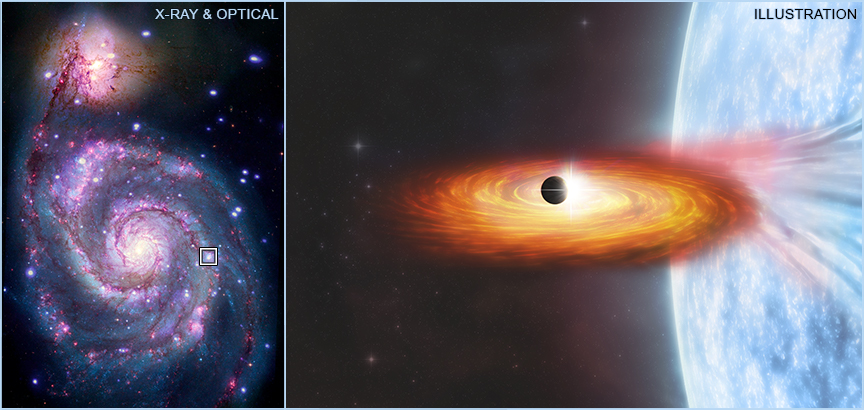Chandra Sees Evidence for Possible Planet in Another Galaxy
Posted: Mon Oct 25, 2021 6:04 pm
Chandra Sees Evidence for Possible Planet in Another Galaxy
NASA | MSFC | SAO | Chandra X-ray Observatory | 2021 Oct 25
A Possible Planet Candidate in an External Galaxy Detected through X-ray Transit ~ Rosanne Di Stefano et al
M51-ULS-1b: The First Candidate for a Planet in an External Galaxy ~ Rosanne Di Stefano et al
NASA | MSFC | SAO | Chandra X-ray Observatory | 2021 Oct 25
Astronomers have found evidence for a possible planet candidate in the M51 ("Whirlpool") galaxy, potentially representing what would be the first planet seen to transit a star outside of the Milky Way. As reported in our latest press release, researchers used NASA's Chandra X-ray Observatory to detect the dimming of X-rays from an "X-ray binary", a system where a Sun-like star is in orbit around a neutron star or black hole. The authors interpret this dimming as being a planet passing in front of the neutron star or black hole.
The left panel of this graphic shows M51 in X-rays from Chandra (purple and blue) and optical light from NASA's Hubble Space Telescope (red, green, and blue). A box marks the location of the possible planet candidate, an X-ray binary known as M51-ULS-1. An artist's illustration in the right panel depicts the X-ray binary and possible planet. Material from the companion star (white and blue in illustration) is pulled onto the neutron star or black hole, forming a disk around the dense object (illustrated as red and orange). The material near the dense object becomes superheated, causing it to glow in X-ray light (white). The planet is shown beginning to pass in front of this source of X-rays.
A Possible Planet Candidate in an External Galaxy Detected through X-ray Transit ~ Rosanne Di Stefano et al
M51-ULS-1b: The First Candidate for a Planet in an External Galaxy ~ Rosanne Di Stefano et al
- arXiv.org > astro-ph > arXiv:2009.08987 > 18 Sep 2020
